Fresh Content SEO Tutorial updated September 2019, minor update March 2020.
An SEO question that arises from time to time is, does Google prefer fresh SEO content?
And if Google does prefer fresh content, would simply changing the date or making minor updates result in a Google rankings boost due to some kind of freshness factor?
The above is the sort of SEO questions asked by those new to search engine optimization and on the various SEO forums where there’s a tendency to state as an SEO fact Google prefers fresh content vs old content without actually proving it’s true!
SEO misinformation is pervasive, concepts like “Google prefers fresh content over old content” is repeated over and over again on blogs etc… as a well known SEO fact by people who do NOT understand search engine optimization resulting in hundreds of thousands of webmasters being misinformed!
A Google search for “Google prefers fresh content” shows just how pervasive this is, a few select quotes:
- 66. Page Age: Although Google prefers fresh content, an older page that’s regularly updated may outperform a newer page. – https://backlinko.com/google-ranking-factors
- This is because Google prefers fresh content to stale content. – http://credible-content.com/blog/important-publish-fresh-content-regularly-website/
- 2. Google prefers fresh content – https://bloggingwizard.com/seo-tactics-to-boost-your-rankings/
- The reason for this being that Google prefers fresh content and this helps it rank higher up in search results. – https://shanebarker.com/blog/seo-and-content-marketing/
- Remember, Google prefers fresh content to old one. – https://business.trustpilot.com/reviews/browsers-to-buyers/how-to-increase-website-traffic-to-your-site-5-easy-ways
All these and many more articles regarding SEO are wrong.
What is Google Fresh Content?
For this SEO tutorial fresh content would be an old webpage that’s been recently updated: not a new webpage, obviously a new webpage is always fresh content and Google loves new content under some scenarios like news sites.
This tutorial is looking at whether the act of updating already indexed webpages equals better Google rankings and possible black hat SEO ways to game Google by tricking the search engine into believing an old piece of content is fresh and so should be ranked higher.
If the SEO experts who state as an SEO fact fresh content is ranked higher by Google are correct, then by varying title tags, alt attributes, h1, h2, h3 headings, anchor text of links, basic body text etc… should gain a Google freshness boost.
A black hat SEO approach to generating fresh content might be along the lines of build a list of related phrases you want to target.
- Google Prefers Fresh Content
- What is Google Fresh Content?
- Fresh Content SEO
- Google Fresh Content = SEO Myth
- SEO Benefits of Fresh Content
- SEO Content Writing
Take the list of related keyword phrases and every time a webpage is visited randomize parts of the content (not hard to do with a PHP driven website). This would be gaming Google, deliberately trying to trick Google into believing a webpage has been updated!
You might put the random phrases within a heading for example (that’s a H3 heading below):
Use A Random Fresh Content SEO Phrase Here
It wouldn’t be difficult to create a few derivatives of a heading and load them randomly.
Do this with other parts of the content** and IF the SEO experts who believe there’s a Google freshness factor are right, it should generate a Google fresh page in the eyes of the search engines ranking algorithm: Google will be tricked into believing you’ve been frantically writing new fresh SEO content.
** It would be easy to create content where words/phrases mean the same thing. In the text above “IF the SEO experts who believe” would have the exact same meaning if I wrote “IF the SEO consultants who believe” or “IF the SEO gurus who believe”. A simple PHP script which randomly chooses one of the three SEO experts/SEO consultants/SEO guru phrases on every page load would result in a unique page on every page load.
Every time Google visits a black hat SEO page like this it will think it’s been updated with new fresh content and give it a ranking boost for being so lemon fresh :-)
But does it actually work?
SEO Myth – Fresh Content = Higher Google Rankings
Unfortunately, there’s one enormous flaw in this “SEO fact”, most stuff you find on SEO forums, even the best SEO forums is a bunch of made up tosh based on circumstantial evidence at best (no real scientifically generated evidence to back up the SEO claims) the search engines preferring fresh content over never changing content is one of those widely believed SEO myths.
I wrote the above way back in 2008 when Google wasn’t that smart and didn’t have machine learning and hadn’t added news to it’s listings. In 2020 as I once again update this SEO tutorial, my original article, though still true in relation to gaming Google (don’t risk it), didn’t cover the changes to the ever evolving Google.
If you run a news site updates/freshness is where the traffic is, (though don’t use risky black hat SEO techniques to trick Google news into believing your news content is fresh) but for most other websites there’s no boost for updating content per se.
I have noticed with some news websites the tendency for them to add a piece of news content and for the news item to be updated with minor changes. I suspect they are to some degree gaming Google news: it works.
I’m afraid for most websites (non-news) it’s not a simple case of update old content = automatic SERPs boost due to the fresh content, Google isn’t that dumb.
Poorly informed webmasters come to conclusions like this in the following way.
Had this webpage for ages and not updated for years, doing OK in Google, but not great. Revamped the webpage/website and Google gave it better SERPs almost over night and sends it more traffic, Eureka Google prefers recently updated content (fresh content) over old static/stale content. Everybody should update their old webpages for better SERPs.
Reality check: this doesn’t occur every time a webpage is updated (if it did, it would be easy to get to number 1 in Google for any SERP), sometimes a change will result in SERPs drops (less traffic).
Most likely real reason for the SERPs improvement is either coincidence: maybe new backlinks finally kicked in, Google changed it’s ranking algorithm or the new content is simply better search engine optimized and so does better in Google due to being better optimized content.
Think about it, a webmaster who frequents and posts on SEO forums etc… wouldn’t deliberately update a webpage with poorly search engine optimized content, when a webmaster like this changes an old webpage there’s a good chance it’s going to be better SEO optimized afterwards.
Even if it did result in worse rankings, they might not associate the SERPs drop with the update, people tend to look for positives in SEO, they want to find the next Google SEO trick to gain better Google rankings.
This also explains why changes don’t always result in SEO improvements, some changes aren’t always an SEO improvement: there’s a lot of bad SEO information out there, easy to make a webpage less optimized following bad SEO advice!
Fresh SEO Content Per Se Does NOT = Better Google SERPs
Better Search Engine Optimized Content = Better Google SERPs
SEO Benefits of Fresh Content
This doesn’t mean there’s no indirect benefit to updating content. If you use WordPress for example, updating the date of a Post puts it back on the Home page and/or to the top of the relevant Categories. In the short-term the old Post with a new date will be linked from the Home page and if you use a Recent Posts widget might be linked sitewide. The higher authority internal links will have a positive SEO impact, BUT it will be at the expense of the WordPress Posts which will lose their Homepage and Recent Posts widget links: some SERPs go up, others go down.
If dates are shown and listed by Google under your sites SERPs, updating the dates will make the content appear fresh to users. It could result in a higher click Thru Rate (CTR) from Google. This article was updated in September 2019 (rewrote a LOT of the content), but the date listed by Google was May 2008, would you be more or less likely to click the search result or go to another result with a 2019 date because you assumed this article was out of date?
Because of this user behaviour I updated the date of this SEO tutorial to the day I updated it. Update: I later modified the WordPress SEO theme I use to list the MODIFIED date rather than the published date, so even a small update changes the post date. I wrote this update on March 8th, 2020 and that was the date shown to Google and users after I clicked the Update button.
SEO Content Writing
Since there appears to be no DIRECT SEO benefit to having ever changing fresh content on an existing webpage, varying your content just to make it fresh could be a very bad SEO idea. Much better SEO wise to write what you think is the best SEO content for each webpage and only update when an update is needed.
This webpage for example first went live in 2008, I’ve updated it multiple times, but NEVER just so it’s ‘fresh’.
Disadvantages of Ever Changing ‘Fresh’ Content
If a webpage is targeting a set of related SERPs like:
- What is fresh content?
- Does Google Prefer Fresh Content?
- Why fresh content is important?
- Fresh Content SEO Tutorial
- How do you write fresh content?
- Fresh Content SEO
The above are some of the SERPs this SEO article is targeting.
The best title tag would be one of the above phrases or a derivative, I’m using: “Fresh Content SEO Tutorial”. I use the same main phrase for the H1 heading.
If this webpage ranks high for the Fresh Content SEO Tutorial SERP in Google, some of that rank will be due to the title tag and the H1 heading, why would I change the title tag/H1 heading just to make it appear fresh for Google?
If I built a PHP script (a WordPress plugin) to randomly change the title tag to the 7 target phrases above when Google re-indexes the webpage this webpages ranking for the “Fresh Content SEO Tutorial” Google SERP will vary based on how optimized the page is for that particular phrase.
Sometimes this webpage would be better optimized for the SERP and other times worse, this pages rankings would fluctuate overtime! That doesn’t sound like a good SEO tactic, how would I track which change resulted in the most traffic?
Since you are trying to trick Google into believing the content is freshly written, that’s black hat SEO and could result in a Google ranking penalty.
Yes you can probably make some small changes to a webpage that won’t impact it’s SERPs, but make the wrong changes and your going to have a negative impact on that pages SERPs and from my perspective it’s better to aim for one highly optimised page to using less optimised phrases in key areas of content in the misguided hope Google likes recently updated ‘fresh’ content.
Put your valuable time into actually updating your content, like I have with this tutorial many times over the past decade or so and write new fresh content on brand new webpages. You are more likely to generate fresh traffic from a new webpage targeting a new set of SERPs vs trying to game Google.
David Law

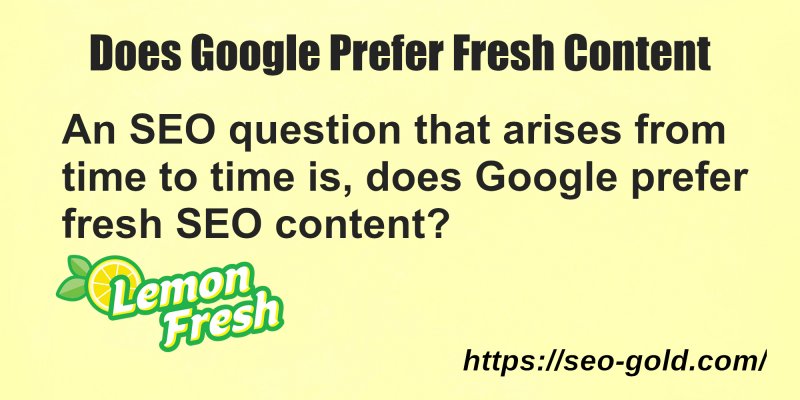
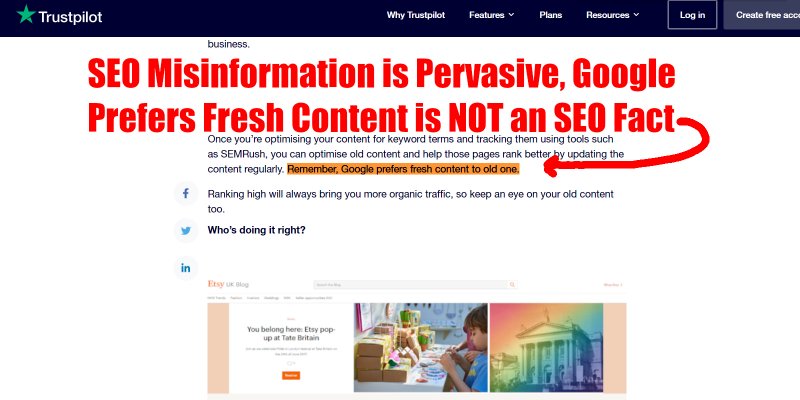
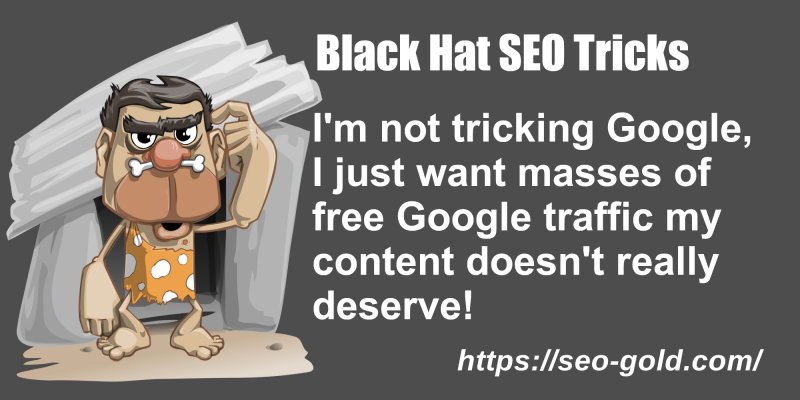
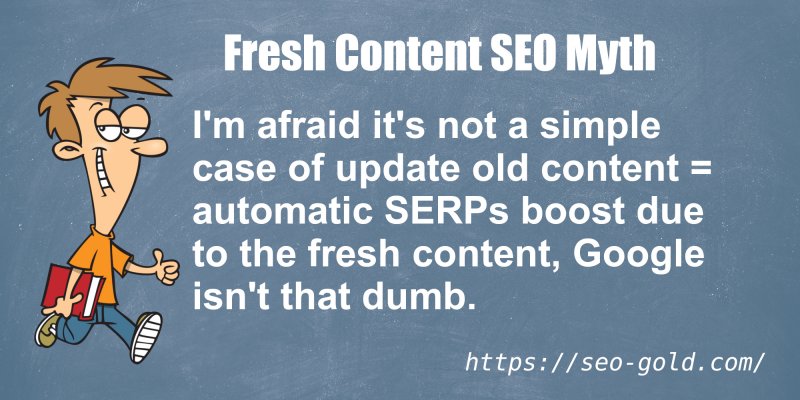
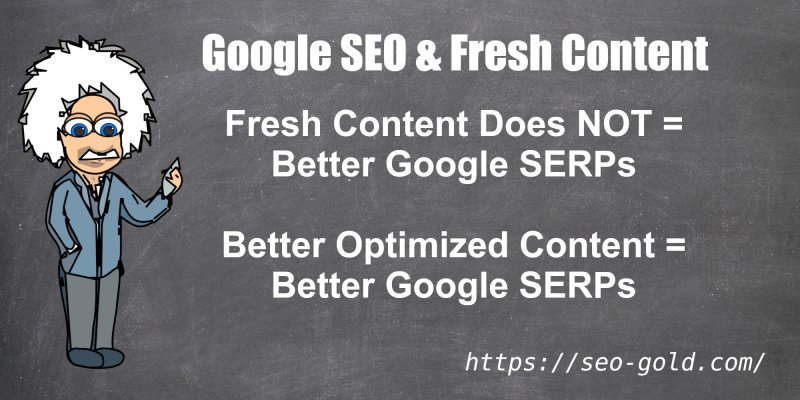




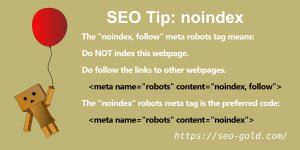
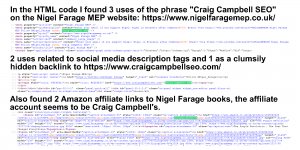
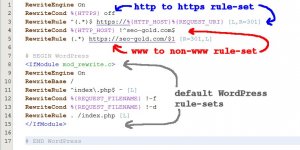




I can agree to most of it. The high ranking of fresh content seems mostly to occur in blogs where new posts are listed on the index page, and get an extra link straight of the index.
Some links on rss sites like technorati can put a post on google’s front page. After a while the post drops off the index page and tag pages, and it drops back in the serps.
agree it, but its very hard to get Fresh Content, sad
I would like to find a sample of how to put a little blog, or a “testimonial of the day” on my index page.
I got 500 plus mini sites. How to write fresh contents Google Like Fresh Updated Contents?
Even I may engage content writers with High cost of writing will it ensure non-duplicate contents?
Then where lies the solutions “how to write fresh content?”
“I got 500 plus mini sites. How to write fresh contents Google Like Fresh Updated Contents?”
Close your 500 spam/rubbish sites and write for 1 proper, quality site. Simple.
I think perhaps people could redefine what fresh content is, versus dynamic content.
Fresh content is new content. Whether it is trendy or not may help it catch more referrals simply due to the excessive volume of searches during that fresh period. Of course making sure that fresh content is seen and indexed and has enough authority or popularity within the domain to gain a good authoritative or popular rank within the search engine result page.
Dynamic Content, or content that changes randomly on each page load, by default, really shouldn’t add any extra bonuses to the ranking. At any given point in time, there might only be one version of the page which can be served to someone who is searching for that content. Reasonably, content which changes dramatically or unpredictably might lose relevance or may be so unpredictable to take a relevance penalty for a given search term falling into the dynamic content areas.
Why serve a page in the search results, if when someone is referred, the content has dynamically swapped out? Maybe things are faster now, who knows for sure right? Doubt there would be a bonus though.
If Google likes Fresh Content, why do static websites get a high ranking with so many page views and make webmasters so much money?
Is there any tool out there that lets me check when was the last time that a website was updated or a new page was added, etc.?
Latest Google new algorithm penguin has been checking the content for spam. If you use duplicate content, your content may be block.
So always use fresh and unique content that will be useful for improvement of traffic.
I think regularly refreshing your content does work in terms of boosting your site in the SERPS. I’ve been experimenting with several pages for a client and each change I’ve made has had a positive effect. The pages were perfectly optimised before too. However, I’m not conclusively stating that it works every time at the moment because I’m still testing this technique.
I agree that you have to take care in making sure you are using the same keywords each time you refresh a page. Refreshing your keywords will definitely have a negative impact on rankings.
One of the biggest reasons I think it could be a worthwhile effort is also because Google does it too. I’ve been watching their Adwords campaign instruction pages for updates. These pages seem to be updated every couple of months and it’s never with any “new” content. It just seems to be refreshed. What’s good for the goose is good for the gander!
As a copywriter, I prefer to write for the end user, rather than an algorithm, although in my line I must do both. To me, REAL fresh content offers new information or insight.
If I were Google, I would consider suspicious websites whose pages are constantly changing (being refreshed as you say). I would think something blackhat is happening. Normal pages do not change their core content. They only grow bigger with comments, there may be change in layout. But good valuable article remains the same. So from common sense perspective it’s bad to have your content refreshed.
But of course this is only hypothesis which needs to be tested.
How does the new Penguin work with the Stallion Responsive I am using? Are there things I need to do like NOT add ‘nofollow’ links to ALL outbound affiliate links on my site?
And, how do I know if you site has taken a hit in the Google rankings? Is this easy to see somewhere?
In the Stallion Responsive you talk a lot about Panda Buster but I have not seen mention of Penguin. What are the differences?
Thanks
Susanne
The Google Penguin updates are generally targeted at off-site SEO, so your backlinks. Penguin is looking for paid links, links from low quality private blog networks, links that are generated to game Google etc…
Stallion Responsive has little direct impact on off-site SEO (doesn’t generate backlinks), about the only major impact will be the anchor text of scraped links and if a webmaster manually adds a link and uses one of your Stallion keyphrases as the anchor text. If your content is scraped the links back will have more varied anchor text, that’s a good thing, so if you get a lot of content scraped might help protect your site from low quality backlinks.
So Stallion has minimal impact on what the Penguin algorithm is looking for.
Google Panda updates are generally looking for low quality content, if you use low quality content Stallion can help improve it a lot, but low quality content is still low quality, only so much a theme can do to improve content.
If your site is high quality content you shouldn’t have any issues. What Google tends to do with each Panda update is target more of what Google considers low quality types of content, so it will look at something like lyrics sites, or affiliate sites and downgrade them so higher quality sites (ones that have taken more effort to create) rise to the top. That’s the theory anyway.
If you have low quality content the Stallion keyphrases can help, it’s not going to change low quality content to high quality, but can make it less obvious it’s low quality, this could be particularly useful using affiliate content or content others use and you are trying to add value to the content. If you build a thin affiliate site and don’t add any value, Google wants to downgrade it. Same thin content with added value (comparison site, reviews, users comments…) Google will try to take the added value into account (remember this is all automated). Using the Stallion keyphrases will add uniqueness to the thin content, it’s not enough on it’s own, but with added value it will make it less likely you’ll be Panda hit.
On your nofollow question Stallion will convert your nofollow affiliate links to cloaked links automatically if you turn the cloaked link feature on under the SEO advanced options page. If you have a lot of affiliate links could help reduce a footprint that suggests you have low quality content. Consider Google rankings are automated, you might not be doing anything wrong, but something you do could look like you are doing something wrong like a fair number of affiliate links.
Note: nothing wrong with affiliate links, it’s the associated content (if thin/duplicate) that can be the issue. If I add an affiliate link to this comment there’s nothing low quality about this content, it’s high quality unique content with an affiliate link: that’s not an issue to Google. If you have thin affiliate duplicate content (content supplied by Amazon for example which thousands of websites use) and have affiliate link to Amazon (just like thousands of other websites), pretty obvious it’s an Amazon affiliate site and Google doesn’t like them. Though affiliate links per se aren’t an issue, it could be something Google looks for to suggest low quality, so cloaking them makes sense. Since nofollow links delete link benefit getting rid of nofollow links (as mentioned above Stallion can achieve this automatically) makes a lot of sense for all sites.
Google Hummingbird was a major algorithm change, some have described Hummingbird as getting a new engine for a car with new ways to achieve better performance (I’m not into cars, so not the best analogy for me :-)). Google basically rebuilt their search algorithm last years, doesn’t mean it’s completely new, they will have kept what worked from the old algorithm framework, but some things are done differently. One interesting feature of Hummingbird is Google’s move to understand natural language searches better.
I suppose you could call it a move towards changing Google into an ask a question engine rather than a keywords search engine. The concept of search is if you want to find something that you might ask a real person “I’d like to learn SEO please” with a search engine you’d type “Learn SEO Marketing” or “SEO Marketing Learn”. Google is trying to incorporate more natural language searches, so users can type “I’d like to learn SEO Marketing please” and Google won’t specifically look for the exact phrase, but the main elements of the phrase “Learn SEO Marketing”, so like a human Google is trying to concentrate on the important parts of the question (“I’d like to” and “please” aren’t important). It’s early days (not going to be a major SEO factor yet), but looks like that’s where Google is heading.
The Stallion keyphrases could help with this, if you vary them with what users might search for it will indicate to Google your page is related to more possible SERPs.
Remember all these algorithm updates aren’t stand alone, they all interact, so it’s one algorithm with small updates that Google/SEO’s give names like Panda, Penguin, Hummingbird, Pigeon…
There’s no easy way to check if a particular update has had a negative impact on a site. NEVER make rash changes during an update, while the Google update is ongoing rankings can be all over the place. For this site some of my SERPs were down for a day or so, not going to react yet (might be OK already). I’ll wait a few weeks for the update to be complete and to see if Google rolls it back: Google makes a habit of rolling out updates that are too hard, so they roll them back a bit. If you get hit with a harsh update that’s rolled back a couple of weeks later the last thing you need is making panic changes between the update and the roll back.
David